Unit 1 The King's new clothes单元复习课件(共44张PPT)
文档属性
| 名称 | Unit 1 The King's new clothes单元复习课件(共44张PPT) |
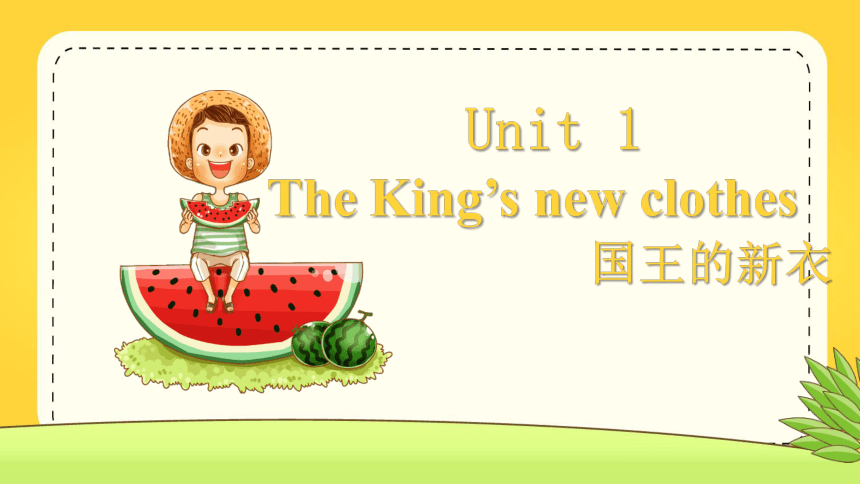
|
|
| 格式 | pptx | ||
| 文件大小 | 6.2MB | ||
| 资源类型 | 试卷 | ||
| 版本资源 | 牛津译林版 | ||
| 科目 | 英语 | ||
| 更新时间 | 2021-08-20 15:41:13 | ||
图片预览

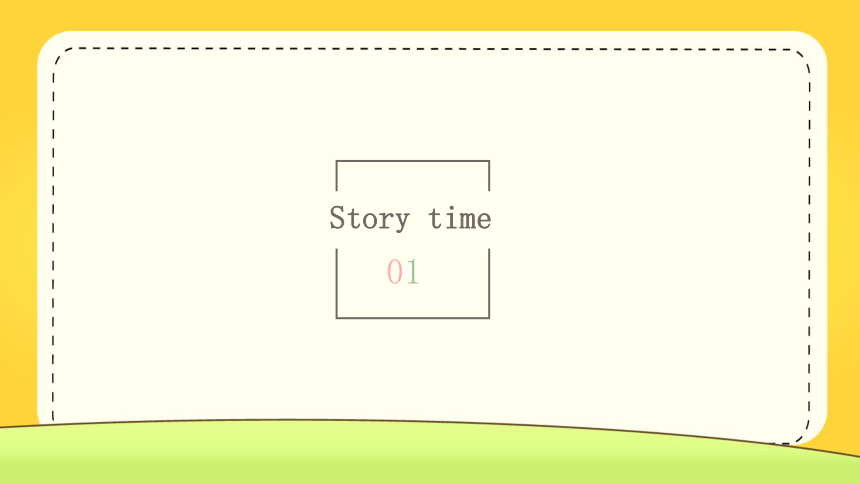
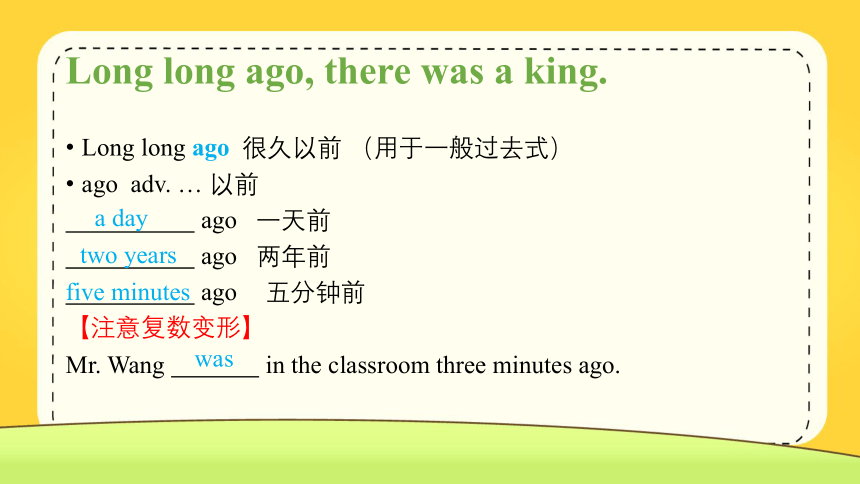
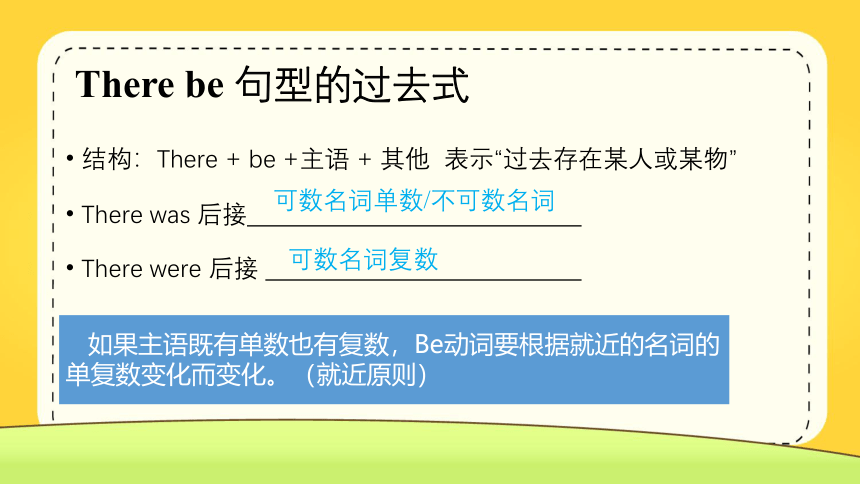
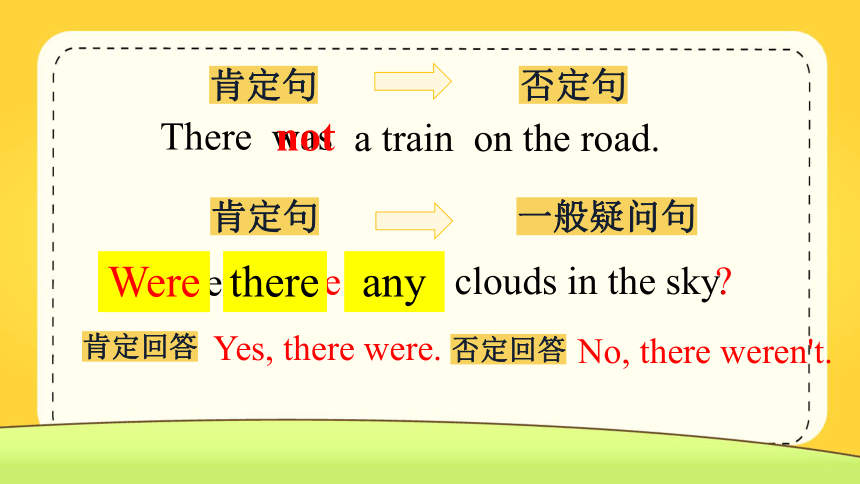
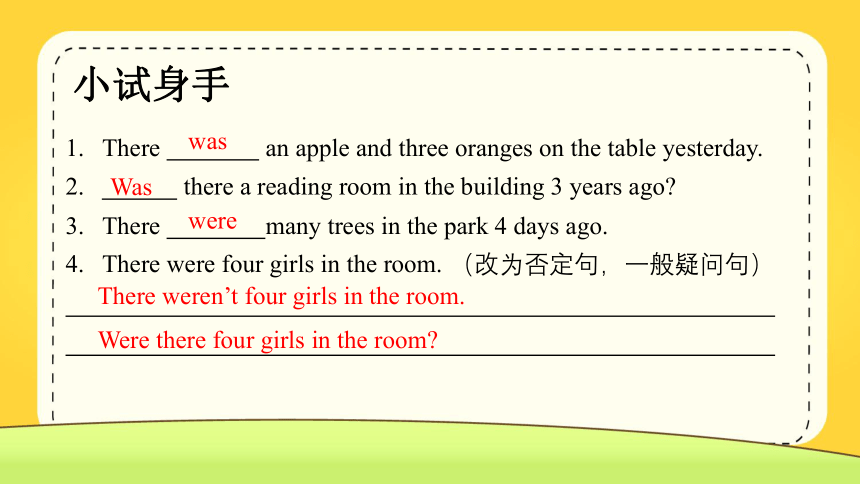
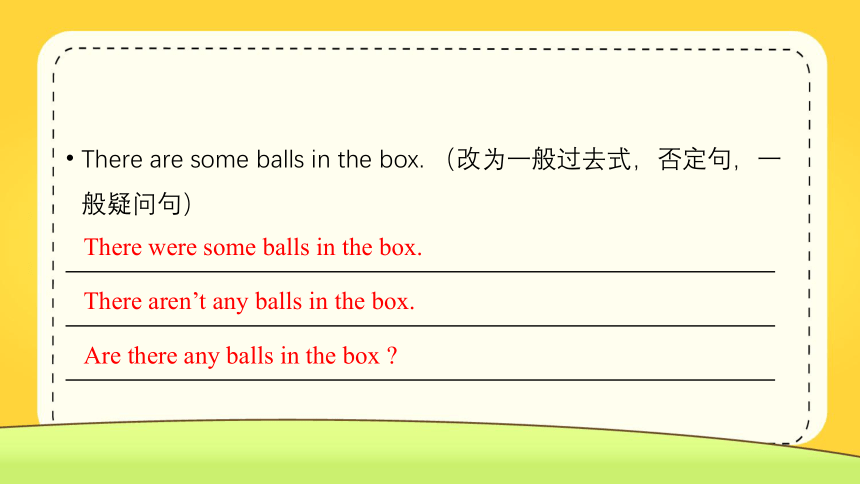

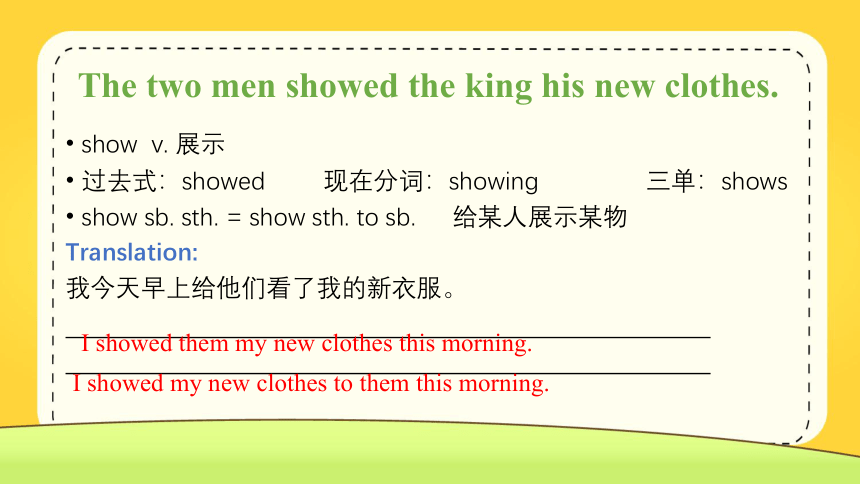
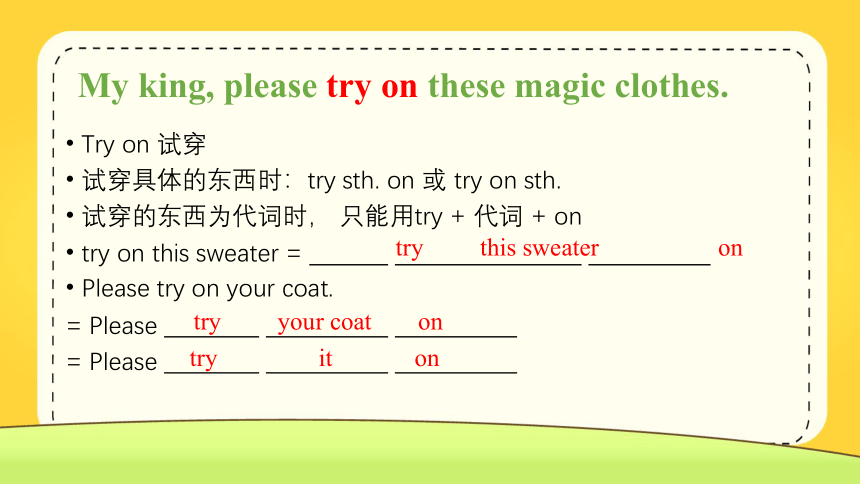
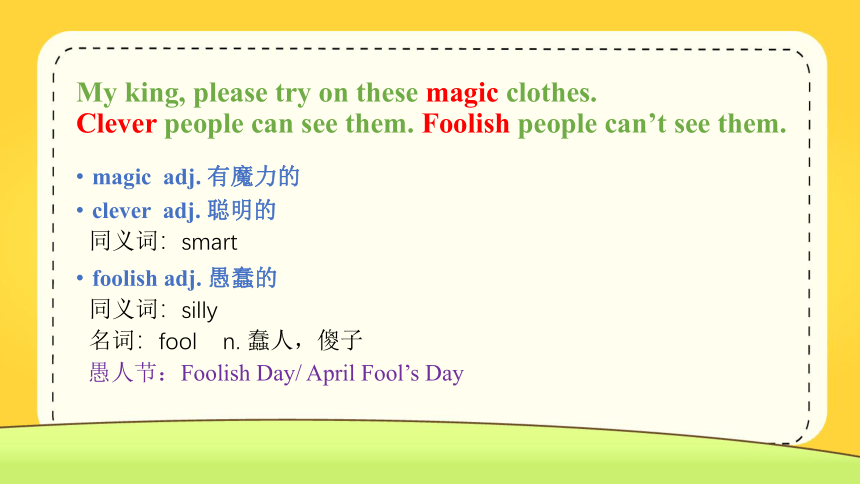
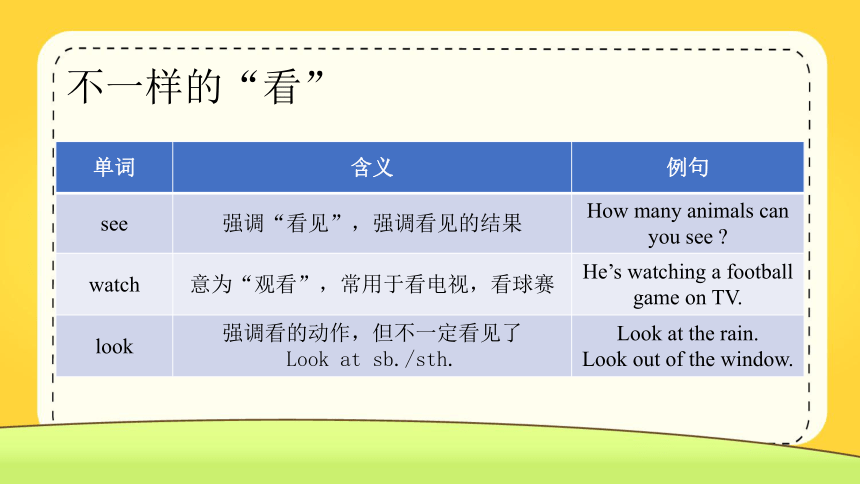
文档简介
(共44张PPT)
Unit
1
The
King’s
new
clothes
国王的新衣
Story
time
01
Long
long
ago,
there
was
a
king.
Long
long
ago
很久以前
(用于一般过去式)
ago
adv.
…
以前
ago
一天前
ago
两年前
ago
五分钟前
【注意复数变形】
Mr.
Wang
in
the
classroom
three
minutes
ago.
a
day
two
years
five
minutes
was
There
be
句型的过去式
结构:There
+
be
+主语
+
其他
表示“过去存在某人或某物”
There
was
后接
There
were
后接
There
a
pen
and
some
books
near
the
computer.
There
some
crayons
and
a
knife
in
my
bag.
可数名词单数/不可数名词
可数名词复数
was
were
如果主语既有单数也有复数,Be动词要根据就近的名词的单复数变化而变化。(就近原则)
a
train
on
the
road.
肯定句
There
was
not
否定句
肯定句
一般疑问句
肯定回答
Yes,
there
were.
否定回答
No,
there
weren't.
some
clouds
in
the
sky.
were
There
Were
there
?
any
小试身手
There
an
apple
and
three
oranges
on
the
table
yesterday.
there
a
reading
room
in
the
building
3
years
ago?
There
many
trees
in
the
park
4
days
ago.
There
were
four
girls
in
the
room.
(改为否定句,一般疑问句)
was
Was
were
There
weren’t
four
girls
in
the
room.
Were
there
four
girls
in
the
room?
There
are
some
balls
in
the
box.
(改为一般过去式,否定句,一般疑问句)
There
were
some
balls
in
the
box.
There
aren’t
any
balls
in
the
box.
Are
there
any
balls
in
the
box
?
One
day,
two
men
visited
the
king.
visit
v.
访问;拜访;参观
过去式:visited
现在分词:visiting
三单:visits
visit
sb./sp.
拜访某人/参观某地
参观南京
看望我的祖父母
visit
Nanjing
visit
my
grandparents
show
v.
展示
过去式:showed
现在分词:showing
三单:shows
show
sb.
sth.
=
show
sth.
to
sb.
给某人展示某物
Translation:
我今天早上给他们看了我的新衣服。
The
two
men
showed
the
king
his
new
clothes.
I
showed
them
my
new
clothes
this
morning.
I
showed
my
new
clothes
to
them
this
morning.
Try
on
试穿
试穿具体的东西时:try
sth.
on
或
try
on
sth.
试穿的东西为代词时,
只能用try
+
代词
+
on
try
on
this
sweater
=
Please
try
on
your
coat.
=
Please
=
Please
My
king,
please
try
on
these
magic
clothes.
try
this
sweater
on
try
your
coat
on
try
it
on
magic
adj.
有魔力的
clever
adj.
聪明的
同义词:smart
foolish
adj.
愚蠢的
同义词:silly
名词:fool
n.
蠢人,傻子
愚人节:Foolish
Day/
April
Fool’s
Day
My
king,
please
try
on
these
magic
clothes.
Clever
people
can
see
them.
Foolish
people
can’t
see
them.
不一样的“看”
单词
含义
例句
see
强调“看见”,强调看见的结果
How
many
animals
can
you
see
?
watch
意为“观看”,常用于看电视,看球赛
He’s
watching
a
football
game
on
TV.
look
强调看的动作,但不一定看见了
Look
at
sb./sth.
Look
at
the
rain.
Look
out
of
the
window.
walk
through
the
city
走过城市
through
穿过
The
king
walked
through
the
city
in
his
new
clothes.
单词
不同点
举例
through
从…
…
里面穿过
through
the
forest
穿过森林
through
the
city
穿过城市
across
从…
…
上面穿过;横穿
across
the
road
穿过马路
across
the
river
穿过河流
Look
left
and
right
before
you
go
the
street.
across
小试身手
The
river
flows(流淌)
our
city.
(
through/across)
She
swam
(
through/across)
the
river.
He
pass
(
through/across)
the
hall.
The
sunlight
was
coming
in
the
window.
(
through/across)
through
across
through
through
Shout
v.
喊叫
过去式:shouted
现在分词:shouting
三单:shouts
固定搭配:shout
at
sb.
朝某人喊叫
shout
at
sb.
to
do
sth.
朝某人喊叫做某事
E.g.
I
wish
you’d
stop
shouting
the
children.
A.
out
B.
at
C.
in
D.
for
They
looked
at
the
king
and
shouted,“What
beautiful
clothes”
B
point
v.
指
固定搭配:
point
at
指着
point
to
指向
point
out
指出
区分
point
at/to
point
at
指“较近”的事物,强调指的对象;
point
to
指“较远”的事物,强调指的方向
A
little
boy
pointed
at
the
king
and
laughed
laugh
/
lɑ?f/
v.
笑,大笑
过去式:laughed
现在分词:laughing
三单:laughs
固定搭配:
laugh
at
嘲笑
laugh
at
sb./sth.
嘲笑某人、物
反义词:cry
e.g.
Suddenly,
he
began
to
laugh.
突然,他开始大笑。
Children
are
laughing
at
the
short
fat
boy.
孩子们在嘲笑那个矮矮的胖男孩。
laugh
cry
wear
v.
穿着;戴着;留着
1.
wear
(穿着)
+
衣服、鞋子
She
wears
a
nice
coat.
2.
wear
(戴着)
+
眼镜、帽子
She
wears
sunglasses.
3.
wear
(留着)
+
头发、胡须
She
wears
long
hair.
wear
&
put
on
&
in
The
king
isn’t
wearing
any
clothes.
wear
Put
on
in
穿着,戴着
穿上,戴上
穿着某个颜色衣服
表示状态
表示动作
in
+
颜色
小试身手
She
is
a
red
dress.
Tom
a
pair
of
glasses.
It’s
cold.
your
coat.
She
always
black
clothes.
wearing
wears
put
on
in
Grammar
time
02
It
was
sunny
yesterday.
We
cleaned
the
room
last
week.
They
stopped
to
have
a
rest
just
now.
yesterday.
last
week
just
now
They
arrived
in
Nanjing
yesterday
afternoon.
yesterday
afternoon
David
studied
hard
last
year.
last
year
They
had
a
Maths
lesson
this
morning.
this
morning
Key
words:
yesterday,
yesterday
morning,
yesterday
afternoon,
yesterday
evening
last
night,
last
week,
last
April,
last
year
an
hour
ago,
four
days
ago,
one
year
ago
It
was
sunny
yesterday.
We
cleaned
the
room
last
week.
They
stopped
to
have
a
rest
just
now.
They
arrived
in
Nanjing
yesterday
afternoon.
David
studied
hard
last
year.
They
had
a
Maths
lesson
this
morning.
cleaned
arrived
studied
stopped
was
had
一般情况下,直接加
ed
以e结尾的动词,直接加
d
以辅音字母y结尾的动词,变y为
再加
i
ed
以重读闭音节结尾,双写最后的辅音字母,再加ed
不规则变化
[一般过去时的基本形式]
结构
用法
例句
主语+was/were+其他
表示过去发生的动作或存在的状态
The
weather
was
cold
yesterday.
昨天天气很冷。
主语+动词过去式+其他
表示过去经常或反复发生的动作
When
I
was
a
child,
I
often
played
football
in
the
street.
当我还是个孩子时,我经常在街上踢足球。
visit
Britain
in
2015
Xi
Jinping
visited
Britain
in
2015.
Practice
Lily
did
her
homework
two
days
ago.
Practice
do
homework
2
days
ago
Tim
studied
English
just
now.
Practice
Study
English
just
now
Practice
arrive
5
minutes
ago
The
bus
arrived
5
minutes
ago.
Tia
is
a
teacher
now.
Tia
is
not
a
teacher
now.
否
疑
Is
Tia
a
teacher
now?
10
years
ago
Tia
was
a
student
10
years
ago.
否
Tia
was
not
a
student
10
years
ago.
疑
Was
Tia
a
student
10
years
ago?
主语+was/were+not+其他
Was/Were+主语+其他……?
They
play
table
tennis
every
day.
They
don’t
play
table
tennis
every
day.
否
疑
Do
they
play
table
tennis
every
day?
2
days
ago
They
played
table
tennis
2
days
ago.
否
They
didn’t
play
table
tennis
2
days
ago.
疑
Did
they
play
table
tennis
2
days
ago?
主语+didn’t+动词原形
Did+主语+动词原形……?
一般过去时的特殊疑问式
疑问词+did+主语+动词原形……?
They
finished
their
work
at
four.
A
B
对划线部分提问
What
did
they
do
at
four?
When
did
they
finish
their
work?
改头换面(句式变化)
按要求改写句子。
He
found
a
book
in
the
room.
否定:_____________________________
一般疑问句:
_____________________________
特殊疑问句
(对a
book
提问)
______________________________
He
didn’t
find
a
book
in
the
room.
Did
he
find
a
book
in
the
room?
What
did
he
find
in
the
room?
Cartoon
time
03
Miss
Fox
and
her
students
are
telling
a
story.
“说”不同:tell、speak、say、talk
单词
用法
例句
tell
“讲,叙述;告诉”
Please
tell
me
more
about
the
cat.
speak
“会说(某种语言)”
Can
you
speak
Chinese?
say
“说……
”强调说的内容
She
says
she’ll
come
here.
talk
“谈论”,强调两人或多人间的谈话
They’re
talking
about
the
weather.
小试身手
Can
you
Chinese?
Look!
Our
English
teacher
is
.
Tom
,
“
There
was
a
house
on
the
mountain.”
When
I
was
young,
my
mother
often
me
stories
in
the
evening.
speak
talking
says
told
Each
student
says
one
sentence.
each
det./pron.
每个
each后接名词单数,谓语动词要用单数形式
Each
boy
has
a
bike.
Each
answer
is
right.
Translation:
每个学生都必须完成家庭作业。(
have
to
)
Each
student
has
to
finish
homework.
Miss
Fox
starts.
start
v.
开始
三单:starts
过去式:started
现在分词:starting
固定搭配:start
sth.
开始某事
start
doing
sth.
开始做某事
同义词:begin
开始
e.g.
We
start
school
in
September.
我们在九月份开始新学期。
She
start
laughing.
她开始笑了起来。
next
/nekst/
adj.
下一个
反义词:last
adj.
上一个
短语:next
time
下次;
next
week
下周;
next
month
下周
next
year
明年
the
next
day
第二天
e.g.
The
next
train
to
Shanghai
is
at
nine.
下一趟去上海的车九点钟出发。
It
is
Bobby’s
turn.
turn
n.
机会
E.g.
It’s
your
turn
now.
现在轮到你了。
v.
转;变得
e.g.
Turn
right
at
the
first
crossing.
在第一个十字路口向右转。
The
trees
turn
green
in
autumn.
树变绿了。
He
is
thinking
hard.
hard
adv.
努力地;勤奋地
短语:work
hard
努力工作
E.g.
She
studied
hard.
她努力学习。
练一练:
He
is
,
but
still
doesn’t
work.
他一直很努力工作,但是没有效果。
working
hard
One
day,
an
old
man
walked
by
the
house.
adv.
经过
walk
by
走过;
drive
by
开车经过
prep.
表示
“在…旁边”
;表示“乘坐…”
by+地方,by
the
lake/river/tree/door
by+交通工具,by
train/bus/bike/car
小试身手
1.
Each
girl
dancing
and
singing
now.(like)
2.
Let’s
read
.(sentence)
3.
Let’s
our
lesson,
boys
and
girls.
(start)
4.
He
quick
to
tell
the
story.
(be)
5.
Mark,
what
next?
(be)
6.
It’s
turn.
(he)
7.
Who
is
study
hard?
(study)
likes
a
sentence
start
is
is
his
studying
THANKS!
谢谢
21世纪教育网(www.21cnjy.com)
中小学教育资源网站
有大把高质量资料?一线教师?一线教研员?
欢迎加入21世纪教育网教师合作团队!!月薪过万不是梦!!
详情请看:
https://www.21cnjy.com/help/help_extract.php
Unit
1
The
King’s
new
clothes
国王的新衣
Story
time
01
Long
long
ago,
there
was
a
king.
Long
long
ago
很久以前
(用于一般过去式)
ago
adv.
…
以前
ago
一天前
ago
两年前
ago
五分钟前
【注意复数变形】
Mr.
Wang
in
the
classroom
three
minutes
ago.
a
day
two
years
five
minutes
was
There
be
句型的过去式
结构:There
+
be
+主语
+
其他
表示“过去存在某人或某物”
There
was
后接
There
were
后接
There
a
pen
and
some
books
near
the
computer.
There
some
crayons
and
a
knife
in
my
bag.
可数名词单数/不可数名词
可数名词复数
was
were
如果主语既有单数也有复数,Be动词要根据就近的名词的单复数变化而变化。(就近原则)
a
train
on
the
road.
肯定句
There
was
not
否定句
肯定句
一般疑问句
肯定回答
Yes,
there
were.
否定回答
No,
there
weren't.
some
clouds
in
the
sky.
were
There
Were
there
?
any
小试身手
There
an
apple
and
three
oranges
on
the
table
yesterday.
there
a
reading
room
in
the
building
3
years
ago?
There
many
trees
in
the
park
4
days
ago.
There
were
four
girls
in
the
room.
(改为否定句,一般疑问句)
was
Was
were
There
weren’t
four
girls
in
the
room.
Were
there
four
girls
in
the
room?
There
are
some
balls
in
the
box.
(改为一般过去式,否定句,一般疑问句)
There
were
some
balls
in
the
box.
There
aren’t
any
balls
in
the
box.
Are
there
any
balls
in
the
box
?
One
day,
two
men
visited
the
king.
visit
v.
访问;拜访;参观
过去式:visited
现在分词:visiting
三单:visits
visit
sb./sp.
拜访某人/参观某地
参观南京
看望我的祖父母
visit
Nanjing
visit
my
grandparents
show
v.
展示
过去式:showed
现在分词:showing
三单:shows
show
sb.
sth.
=
show
sth.
to
sb.
给某人展示某物
Translation:
我今天早上给他们看了我的新衣服。
The
two
men
showed
the
king
his
new
clothes.
I
showed
them
my
new
clothes
this
morning.
I
showed
my
new
clothes
to
them
this
morning.
Try
on
试穿
试穿具体的东西时:try
sth.
on
或
try
on
sth.
试穿的东西为代词时,
只能用try
+
代词
+
on
try
on
this
sweater
=
Please
try
on
your
coat.
=
Please
=
Please
My
king,
please
try
on
these
magic
clothes.
try
this
sweater
on
try
your
coat
on
try
it
on
magic
adj.
有魔力的
clever
adj.
聪明的
同义词:smart
foolish
adj.
愚蠢的
同义词:silly
名词:fool
n.
蠢人,傻子
愚人节:Foolish
Day/
April
Fool’s
Day
My
king,
please
try
on
these
magic
clothes.
Clever
people
can
see
them.
Foolish
people
can’t
see
them.
不一样的“看”
单词
含义
例句
see
强调“看见”,强调看见的结果
How
many
animals
can
you
see
?
watch
意为“观看”,常用于看电视,看球赛
He’s
watching
a
football
game
on
TV.
look
强调看的动作,但不一定看见了
Look
at
sb./sth.
Look
at
the
rain.
Look
out
of
the
window.
walk
through
the
city
走过城市
through
穿过
The
king
walked
through
the
city
in
his
new
clothes.
单词
不同点
举例
through
从…
…
里面穿过
through
the
forest
穿过森林
through
the
city
穿过城市
across
从…
…
上面穿过;横穿
across
the
road
穿过马路
across
the
river
穿过河流
Look
left
and
right
before
you
go
the
street.
across
小试身手
The
river
flows(流淌)
our
city.
(
through/across)
She
swam
(
through/across)
the
river.
He
pass
(
through/across)
the
hall.
The
sunlight
was
coming
in
the
window.
(
through/across)
through
across
through
through
Shout
v.
喊叫
过去式:shouted
现在分词:shouting
三单:shouts
固定搭配:shout
at
sb.
朝某人喊叫
shout
at
sb.
to
do
sth.
朝某人喊叫做某事
E.g.
I
wish
you’d
stop
shouting
the
children.
A.
out
B.
at
C.
in
D.
for
They
looked
at
the
king
and
shouted,“What
beautiful
clothes”
B
point
v.
指
固定搭配:
point
at
指着
point
to
指向
point
out
指出
区分
point
at/to
point
at
指“较近”的事物,强调指的对象;
point
to
指“较远”的事物,强调指的方向
A
little
boy
pointed
at
the
king
and
laughed
laugh
/
lɑ?f/
v.
笑,大笑
过去式:laughed
现在分词:laughing
三单:laughs
固定搭配:
laugh
at
嘲笑
laugh
at
sb./sth.
嘲笑某人、物
反义词:cry
e.g.
Suddenly,
he
began
to
laugh.
突然,他开始大笑。
Children
are
laughing
at
the
short
fat
boy.
孩子们在嘲笑那个矮矮的胖男孩。
laugh
cry
wear
v.
穿着;戴着;留着
1.
wear
(穿着)
+
衣服、鞋子
She
wears
a
nice
coat.
2.
wear
(戴着)
+
眼镜、帽子
She
wears
sunglasses.
3.
wear
(留着)
+
头发、胡须
She
wears
long
hair.
wear
&
put
on
&
in
The
king
isn’t
wearing
any
clothes.
wear
Put
on
in
穿着,戴着
穿上,戴上
穿着某个颜色衣服
表示状态
表示动作
in
+
颜色
小试身手
She
is
a
red
dress.
Tom
a
pair
of
glasses.
It’s
cold.
your
coat.
She
always
black
clothes.
wearing
wears
put
on
in
Grammar
time
02
It
was
sunny
yesterday.
We
cleaned
the
room
last
week.
They
stopped
to
have
a
rest
just
now.
yesterday.
last
week
just
now
They
arrived
in
Nanjing
yesterday
afternoon.
yesterday
afternoon
David
studied
hard
last
year.
last
year
They
had
a
Maths
lesson
this
morning.
this
morning
Key
words:
yesterday,
yesterday
morning,
yesterday
afternoon,
yesterday
evening
last
night,
last
week,
last
April,
last
year
an
hour
ago,
four
days
ago,
one
year
ago
It
was
sunny
yesterday.
We
cleaned
the
room
last
week.
They
stopped
to
have
a
rest
just
now.
They
arrived
in
Nanjing
yesterday
afternoon.
David
studied
hard
last
year.
They
had
a
Maths
lesson
this
morning.
cleaned
arrived
studied
stopped
was
had
一般情况下,直接加
ed
以e结尾的动词,直接加
d
以辅音字母y结尾的动词,变y为
再加
i
ed
以重读闭音节结尾,双写最后的辅音字母,再加ed
不规则变化
[一般过去时的基本形式]
结构
用法
例句
主语+was/were+其他
表示过去发生的动作或存在的状态
The
weather
was
cold
yesterday.
昨天天气很冷。
主语+动词过去式+其他
表示过去经常或反复发生的动作
When
I
was
a
child,
I
often
played
football
in
the
street.
当我还是个孩子时,我经常在街上踢足球。
visit
Britain
in
2015
Xi
Jinping
visited
Britain
in
2015.
Practice
Lily
did
her
homework
two
days
ago.
Practice
do
homework
2
days
ago
Tim
studied
English
just
now.
Practice
Study
English
just
now
Practice
arrive
5
minutes
ago
The
bus
arrived
5
minutes
ago.
Tia
is
a
teacher
now.
Tia
is
not
a
teacher
now.
否
疑
Is
Tia
a
teacher
now?
10
years
ago
Tia
was
a
student
10
years
ago.
否
Tia
was
not
a
student
10
years
ago.
疑
Was
Tia
a
student
10
years
ago?
主语+was/were+not+其他
Was/Were+主语+其他……?
They
play
table
tennis
every
day.
They
don’t
play
table
tennis
every
day.
否
疑
Do
they
play
table
tennis
every
day?
2
days
ago
They
played
table
tennis
2
days
ago.
否
They
didn’t
play
table
tennis
2
days
ago.
疑
Did
they
play
table
tennis
2
days
ago?
主语+didn’t+动词原形
Did+主语+动词原形……?
一般过去时的特殊疑问式
疑问词+did+主语+动词原形……?
They
finished
their
work
at
four.
A
B
对划线部分提问
What
did
they
do
at
four?
When
did
they
finish
their
work?
改头换面(句式变化)
按要求改写句子。
He
found
a
book
in
the
room.
否定:_____________________________
一般疑问句:
_____________________________
特殊疑问句
(对a
book
提问)
______________________________
He
didn’t
find
a
book
in
the
room.
Did
he
find
a
book
in
the
room?
What
did
he
find
in
the
room?
Cartoon
time
03
Miss
Fox
and
her
students
are
telling
a
story.
“说”不同:tell、speak、say、talk
单词
用法
例句
tell
“讲,叙述;告诉”
Please
tell
me
more
about
the
cat.
speak
“会说(某种语言)”
Can
you
speak
Chinese?
say
“说……
”强调说的内容
She
says
she’ll
come
here.
talk
“谈论”,强调两人或多人间的谈话
They’re
talking
about
the
weather.
小试身手
Can
you
Chinese?
Look!
Our
English
teacher
is
.
Tom
,
“
There
was
a
house
on
the
mountain.”
When
I
was
young,
my
mother
often
me
stories
in
the
evening.
speak
talking
says
told
Each
student
says
one
sentence.
each
det./pron.
每个
each后接名词单数,谓语动词要用单数形式
Each
boy
has
a
bike.
Each
answer
is
right.
Translation:
每个学生都必须完成家庭作业。(
have
to
)
Each
student
has
to
finish
homework.
Miss
Fox
starts.
start
v.
开始
三单:starts
过去式:started
现在分词:starting
固定搭配:start
sth.
开始某事
start
doing
sth.
开始做某事
同义词:begin
开始
e.g.
We
start
school
in
September.
我们在九月份开始新学期。
She
start
laughing.
她开始笑了起来。
next
/nekst/
adj.
下一个
反义词:last
adj.
上一个
短语:next
time
下次;
next
week
下周;
next
month
下周
next
year
明年
the
next
day
第二天
e.g.
The
next
train
to
Shanghai
is
at
nine.
下一趟去上海的车九点钟出发。
It
is
Bobby’s
turn.
turn
n.
机会
E.g.
It’s
your
turn
now.
现在轮到你了。
v.
转;变得
e.g.
Turn
right
at
the
first
crossing.
在第一个十字路口向右转。
The
trees
turn
green
in
autumn.
树变绿了。
He
is
thinking
hard.
hard
adv.
努力地;勤奋地
短语:work
hard
努力工作
E.g.
She
studied
hard.
她努力学习。
练一练:
He
is
,
but
still
doesn’t
work.
他一直很努力工作,但是没有效果。
working
hard
One
day,
an
old
man
walked
by
the
house.
adv.
经过
walk
by
走过;
drive
by
开车经过
prep.
表示
“在…旁边”
;表示“乘坐…”
by+地方,by
the
lake/river/tree/door
by+交通工具,by
train/bus/bike/car
小试身手
1.
Each
girl
dancing
and
singing
now.(like)
2.
Let’s
read
.(sentence)
3.
Let’s
our
lesson,
boys
and
girls.
(start)
4.
He
quick
to
tell
the
story.
(be)
5.
Mark,
what
next?
(be)
6.
It’s
turn.
(he)
7.
Who
is
study
hard?
(study)
likes
a
sentence
start
is
is
his
studying
THANKS!
谢谢
21世纪教育网(www.21cnjy.com)
中小学教育资源网站
有大把高质量资料?一线教师?一线教研员?
欢迎加入21世纪教育网教师合作团队!!月薪过万不是梦!!
详情请看:
https://www.21cnjy.com/help/help_extract.php
